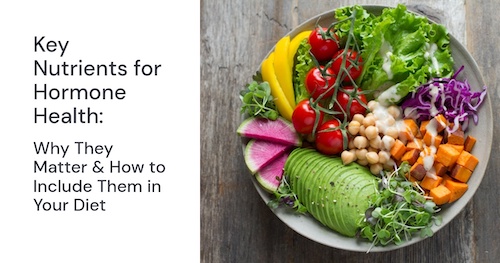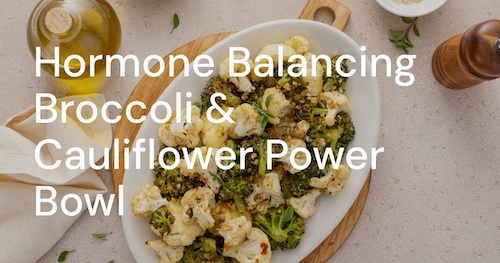|
This section newsletter intro will come.
|
|

Healthy Fats: Healthy fats, such as monounsaturated and polyunsaturated fats, are the building blocks for hormones and play a vital role in hormone production and hormonal balance. These fats also help improve insulin sensitivity, reduce inflammation, and maintain a balanced hormone environment, particularly for cortisol, estrogen, and progesterone levels. Without sufficient fat intake, the body struggles to produce optimal amounts of hormones, which can result in hormonal imbalances.
Food Sources: Avocados, nuts (such as almonds and walnuts), seeds (such as chia, flax, and pumpkin), oil (such as olive, avocado, and coconut), fatty fish (such as salmon, sardines, and mackerel)
How to Incorporate:
- Add avocado slices to salads, sandwiches, or smoothies for a creamy, nutrient-rich boost.
- Sprinkle chia seeds or flaxseeds on oatmeal or yogurt for fiber and a healthy fat combo.
- Use olive oil as your go-to salad dressing, or drizzle overcooked veggies.
- Incorporate fatty fish into your meals at least twice a week by grilling, baking, or adding to salads.
Cruciferous Vegetables: Cruciferous vegetables are packed with indole-3-carbinol, a compound that supports the liver in detoxifying excess estrogen from the body. By aiding the liver in metabolizing and eliminating hormones, these vegetables help prevent estrogen dominance, which can lead to symptoms like bloating, mood swings, and PMS.
Food Sources: Broccoli, brussels sprouts, kale, cauliflower, and cabbage
How to Incorporate:
- Toss Brussels sprouts with olive oil and roast them for a crispy side dish.
- Make a raw kale salad with lemon juice and olive oil, massaging the leaves to soften them.
- Add cauliflower to stir-fries or soups for a nutrient boost.
- Steam broccoli as a side to your dinner, or add it to grain bowls for a fiber-packed option.
Protein-Rich Foods: Proteins play a fundamental role in hormone production because they provide essential amino acids that are the building blocks of hormones. Adequate protein intake is necessary for producing insulin, growth hormones, and thyroid hormones, and it is vital for growth, energy metabolism, appetite, and reproduction. Protein helps decrease the hunger hormone ghrelin while activating the production of hormones that help you feel full.
Food Sources: Plant-based proteins (such as lentils, chickpeas, beans, and quinoa), lean meats (such as chicken, turkey, and lean beef), fish (especially wild-caught salmon), eggs, nuts, and seeds.
How to Incorporate:
- Have scrambled eggs with veggies for breakfast, or add a hard-boiled egg to your lunch salad.
- Prepare a lentil or chickpea stew for a hearty, plant-based dinner option.
- Make a quinoa salad with roasted vegetables and a sprinkle of nuts for an all-in-one meal.
- Add grilled chicken or fish to your meals for a lean protein source.
Fiber-Rich Foods: Fiber plays a key role in regulating blood sugar levels, which is crucial for hormone balance. When blood sugar levels fluctuate, insulin spikes, which can lead to cortisol and estrogen imbalances. Consuming a diet high in fiber, especially soluble fiber, can increase the production of Peptide PYY and Glucagon-like peptide-1 (GLP-1) hormones that make you feel full.
Soluble Fiber Food Sources: Whole grains (such as oats, oat bran, and barley), beans and legumes (such as white beans, black beans, and lentils), fruits (such as apples, pears, and avocados), vegetables (such as sweet potatoes, carrots, and turnips)
How to Incorporate:
- Start your day with a bowl of oatmeal topped with berries and chia seeds for a fiber-packed breakfast.
- Add black beans or lentils to salads, soups, or grain bowls to boost fiber and protein.
- Snack on apple slices with almond butter or hummus with raw veggies.
- Make a roasted veggie tray with sweet potatoes, carrots, and Brussels sprouts for a fiber-rich dinner.
Antioxidant-Rich Foods: Antioxidants protect your cells, including hormone-producing cells, from oxidative stress caused by free radicals. This stress can damage hormone production and lead to imbalances. Antioxidants also support the liver in detoxification, helping to maintain a healthy balance of hormones like estrogen, progesterone, and cortisol.
Food Sources: Berries (blueberries, raspberries, strawberries), dark leafy greens (spinach, Swiss chard), brightly colored vegetables (bell peppers, carrots, beets), green tea, nuts and seeds
How to Incorporate:
- Add a handful of berries to your morning smoothie or oatmeal for an antioxidant punch.
- Make a colorful salad with spinach, bell peppers, and shredded carrots.
- Sip on green tea during the day to help boost your antioxidant intake.
- Snack on raw nuts like almonds or walnuts for a crunchy, nutrient-dense option.
Incorporating these nutrient-rich foods into your daily meals will give your body the essential nutrients to support hormone production and balance. Simple changes like swapping refined carbs for whole grains, adding more cruciferous vegetables to your meals, and increasing your healthy fat intake can make a big difference in your overall well-being.
|
|

Certain foods and dietary patterns have been linked to disrupting hormone balance, potentially leading to issues such as weight gain, mood swings, fertility problems, or increased risk of chronic diseases.
#1. Processed Foods (High in Sugar and Refined Carbohydrates): Processed foods often contain high levels of refined sugars, fats, and additives that can trigger insulin resistance, inflammation, and weight gain. Chronically high insulin levels, in turn, can lead to imbalances in other hormones, such as estrogen and testosterone.
Hormone balancing tip: Reduce consumption of packaged snacks, sugary drinks, and white bread and replace them with whole, unprocessed foods such as:
- Complex carbohydrates: Whole grains like quinoa, brown rice, oats, and sweet potatoes.
- Natural sweeteners: Use honey, maple syrup, or plant-based sweeteners like Stevia.
- Fresh fruits: Satisfy sugar cravings with fiber-rich fruits like berries, apples, and oranges, which have a gentler effect on insulin levels.
#2. Caffeine: Caffeine is a stimulant that can interfere with hormone balance in various ways, particularly by increasing cortisol, disrupting sleep and melatonin production, affecting estrogen and insulin levels, and contributing to dehydration. While moderate caffeine consumption is generally considered safe, monitoring your intake and adjusting it based on your body's response is essential. If you experience symptoms of hormone imbalance, reducing your caffeine intake and adopting healthier lifestyle habits may help restore balance and improve your overall well-being.
Hormone balancing tip: Limit caffeine intake. The FDA suggests that up to 400 mg of caffeine daily (about 3-4 cups of coffee) is safe for adults. However, everyone is different, and therefore it is essential to listen to your body and reduce your intake if you experience symptoms of hormone imbalance. Additional tips to limit caffeine include:
- To protect your sleep and melatonin levels, avoid caffeine consumption after mid-afternoon.
- Choose low-caffeine alternatives such as green tea or caffeine-free herbal teas like chamomile, peppermint, or rooibos.
- Drink plenty of water throughout the day to counteract caffeine's dehydrating effects and support overall hormone function.
#. Alcohol: Alcohol can interfere with hormone balance by increasing cortisol, disrupting blood sugar levels, impairing liver function, and affecting reproductive hormones like estrogen and testosterone. These disruptions can affect many bodily functions, including metabolism, reproductive health, mood, and stress response.
Hormone balancing tip: Sparkling water with citrus, herbal teas, kombucha, and adaptogenic elixirs are great substitutes for hydration, stress reduction, and overall hormone health. Other tips for reducing alcohol intake include:
- If you do consume alcohol, limit your intake to no more than one drink per day for women and two drinks per day for men.
- Alternate alcoholic beverages with water or sparkling water to reduce alcohol intake.
- Designate days or weeks where you refrain from drinking to give your liver time to rest and allow your body to reset.
|
|

Ingredients:
- 1 small head of broccoli, cut into florets
- 1 small head of cauliflower, cut into florets
- 1 tablespoon olive oil
- 1 teaspoon turmeric (anti-inflammatory properties)
- ½ teaspoon cumin (supports digestion)
- ½ teaspoon sea salt
- ¼ teaspoon black pepper
- 1 cup cooked quinoa (plant-based protein and fiber)
- 1 handful of spinach or kale (extra cruciferous veggie boost)
- ½ avocado, sliced (healthy fats for hormone production)
- 1 tablespoon ground flaxseed (supports estrogen metabolism)
Tahini Dressing:
- 1-2 tablespoons tahini (rich in healthy fats and calcium)
- 1 tablespoon lemon juice
- 1 teaspoon maple syrup or honey (optional)
- 1-2 tablespoons water (to thin the dressing)
Instructions:
Preheat your oven to 400°F (200°C) and line a baking sheet with parchment paper.
Toss the broccoli and cauliflower florets in olive oil, turmeric, cumin, salt, and pepper. Spread the florets evenly on the baking sheet.
Roast the veggies in the preheated oven for 20-25 minutes, flipping halfway through, until they are golden brown and slightly crispy.
While the veggies roast, cook the quinoa according to package instructions. Once cooked, fluff with a fork and set aside.
Assemble the bowl:
- Divide the cooked quinoa into two bowls.
- Add a handful of spinach or kale to each bowl, followed by the roasted broccoli and cauliflower.
- Top with sliced avocado and sprinkle with ground flaxseed.
Make the tahini dressing: In a small bowl, whisk together the tahini, lemon juice, maple syrup (if using), and water. Adjust the water until the dressing reaches your desired consistency.
Drizzle the tahini dressing over the bowl and serve immediately. |
|
| |
|
Copyright © 2024 Customized Nutrition Newsletters, All rights reserved.
|
|
| |
|
|





